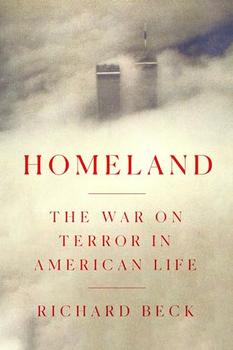
The War on Terror in American Life
by Richard Beck
A groundbreaking history of how the decades-long war on terror changed virtually every aspect of American life, from the erosion of citizenship down to the cars we bought and TV we watched—by an acclaimed n+1 writer.
For twenty years after September 11, the war on terror was simultaneously everywhere and nowhere. With all of the military violence occurring overseas even as the threat of sudden mass death permeated life at home, Americans found themselves living in two worlds at the same time. In one of them, soldiers fought overseas so that nothing at home would have to change at all. In the other, life in the United States took on all kinds of unfamiliar shapes, changing people's sense of themselves, their neighbors, and the strangers they sat next to on airplanes. In Homeland, Richard Beck delivers a gripping exploration of how much the war changed life in the United States and explains why there is no going back.
Though much has been made of the damage that Donald Trump did to the American political system, Beck argues that it was the war on terror that made Trump's presidency possible, fueling and exacerbating a series of crises that all came to a head with his rise to power. Homeland brilliantly isolates and explores four key issues: the militarism that swept through American politics and culture; the racism and xenophobia that boiled over in much of the country; an economic crisis that, Beck convincingly argues, connects the endurance of the war on terror to at least the end of the Second World War; and a lack of accountability that produced our "impunity culture"—the government-wide inability or refusal to face consequences that has transformed how the U.S. government relates to the people it governs.
To see American life through the lens of Homeland's sweeping argument is to understand the roots of our current condition. In its startling analysis of how the war on terror hollowed out the very idea of citizenship in the United States, Beck gives the most compelling explanation yet offered for the ongoing disintegration of America's social, political, and cultural fabric.
"Provocative ... an exhilaratingly fresh take on what ails America." —Publishers Weekly (starred review)
"A well-reasoned, evenhanded account of the cost we've paid at home for chasing terrorists abroad." —Kirkus Reviews
"Richard Beck, like many people alive today, has spent his adult life living in the shadow of 9/11, and Homeland is a devastating inquiry into the new world that day created. Many books have been written about Washington's catastrophic response to the terrorists' attacks. Beck is no less damning, but he is quieter, taking his time to tease out how endless war, moral cowardice, and historical illiteracy have clotted the capillaries of our intellectual and ethical life. Homeland is among the best books I've yet read on the afterlives of 9/11." —Greg Grandin, Pulitzer Prize–winning author of The End of the Myth: From the Frontier to the Border Wall in the Mind of America
"Homeland describes, with a beguiling mix of intellectual precision and passion, and from a novel perspective, the sinister mutations in American life induced by the war on terror. Everyone interested in the fate of democracy, or simply how violence abroad comes home, should read it." —Pankaj Mishra, author of Age of Anger: A History of the Present
This information about Homeland was first featured
in "The BookBrowse Review" - BookBrowse's membership magazine, and in our weekly "Publishing This Week" newsletter. Publication information is for the USA, and (unless stated otherwise) represents the first print edition. The reviews are necessarily limited to those that were available to us ahead of publication. If you are the publisher or author and feel that they do not properly reflect the range of media opinion now available, send us a message with the mainstream reviews that you would like to see added.
Any "Author Information" displayed below reflects the author's biography at the time this particular book was published.
Richard Beck is an editor at n+1 magazine. He is the author of We Believe the Children and lives in Brooklyn, New York.




The low brow and the high brow
Click Here to find out who said this, as well as discovering other famous literary quotes!
Your guide toexceptional books
BookBrowse seeks out and recommends the best in contemporary fiction and nonfiction—books that not only engage and entertain but also deepen our understanding of ourselves and the world around us.